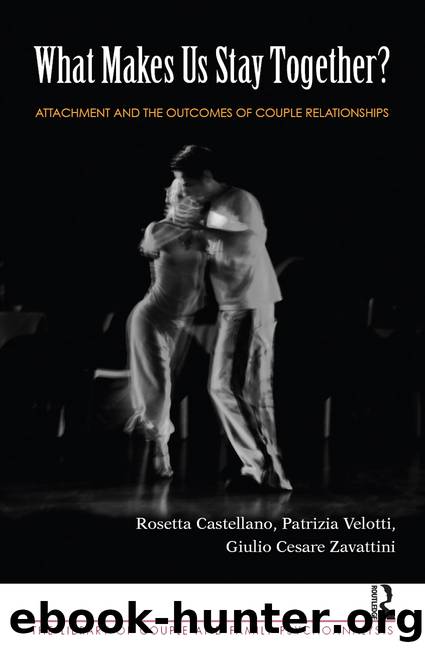What Makes Us Stay Together? by Castellano Rosetta;Velotti Patrizia;Zavattini Giulio Cesare;

Author:Castellano, Rosetta;Velotti, Patrizia;Zavattini, Giulio Cesare;
Language: eng
Format: epub
Publisher: Taylor & Francis Group
The interpersonal and the intrapersonal
An equally useful way of thinking about couple functioning is to focus attention on what the couple is going through in the here and now of a given situation. Here, as well as trying to understand process, it can be useful to look at the level of affective organisation achieved by the partners, and the stage the couple has reached in their relationship.
So, for example, we might imagine a person having difficulty connecting with the mental state of their partner because they have not learned to regulate their own emotional states, perhaps because of an absence of maternal mirroring (Clulow, 2009a; Fonagy, 2006). Such a person is in a difficult situation as they are able neither to express nor manage their emotions in an appropriate manner. It is therefore of no surprise that emotion dysregulation and relational disconnection (characterised by the non-meeting of minds) tend to occur simultaneously.
The bi-directional link between these two elements is often overlooked. Yet it is possible for dysregulated affect to have a negative effect on couple interactions, creating frequent disconnections that require constant and exhausting attempts from the partner to repair ruptures by modifying their own emotional state in order to reconnect to the other. Difficulties in reading and managing affective states may render partners less able to see how they are contributing to conflicts in their close relationships, making them prone to acting impulsively, only to regret their actions later. The ensuing rupture between the partners then creates an emotional disconnection that the distressed partner may interpret as emotional detachment rather than an attempt to alleviate the pain.
The bidirectional link between affect dysregulation and relationship disconnection may result from a dissonance between the partnersâ different strategies for regulating their emotions. Then, affect regulation strategies that function well at an individual level become dysfunctional in the context of the relationship. In this case, it is not so much the disconnection that is problematic but the interaction or lack of congruence between two incompatible strategies of emotion regulation.
Here we might imagine a situation in which a husband has a marked need for protecting his individual freedom as a functional means of regulating his emotional state. If his wifeâs means of regulating her emotional state requires him to be present in the relationship this may be dysfunctional for the relationship. A disconnection is then created between them. The wife, in order to regulate her own activated affective state, may try to talk with her husband, to reconnect with him, because this is her preferred strategy of affect regulation. On a good day, he might recognise her request to talk as a signal of her unease and so respond in a way that regulates her emotional state and reconnects with her. But he might also perceive the approach as an emotionally oppressive rejection of his need for space, and react by avoiding her. A vicious cycle of emotional dysregulation and disconnection in the relationship is then started, which could be self-perpetuating. In other words,
Download
This site does not store any files on its server. We only index and link to content provided by other sites. Please contact the content providers to delete copyright contents if any and email us, we'll remove relevant links or contents immediately.
Through Windows of Opportunity : A Neuroaffective Approach to Child Psychotherapy by Marianne Bentzen; Susan Hart(942)
Overcoming ADHD Without Medication : A Guidebook for Parents and Teachers by Children and Natural Psychology Association for Youth; Children The Association for Youth(880)
Out of the Mainstream: Helping the Children of Parents with a Mental Illness by Loshak Rosemary;(876)
Delphi Collected Works of Sigmund Freud (Illustrated) by Sigmund Freud(644)
The Noom Mindset by Noom(589)
The 48 Laws of Mental Power: Overcoming Trauma and Building Mental Strength by Victor O. Carl(548)
The Psychology of Media and Politics by George Comstock & Erica Scharrer(475)
Sigmund Freud by Janet Sayers;(471)
MANIPULATION & MIND CONTROL: The Persuasion Collection: Dark Psychology Secrets, Analyze & Influence People with Nlp. How to learn Reading Friends and Develop Body Language Skills. by ROBERT TOWER(457)
Behold the Monster by Jillian Lauren(436)
It's nobody's fault: new hope and help for difficult children and their parents by Harold Koplewicz(435)
Totem and Taboo: Some Points of Agreement between the Mental Lives of Savages and Neurotics by Sigmund Freud(423)
The Hypnotic Coach: A Conversational Hypnotherapy Tool Kit by Marion Jess(420)
Directions in Technical Writing and Communication by Gould Jay R.;(411)
Mastering Flow: Perform Better, Experience More Joy, and Live a Happier Life by Nils Salzgeber(402)
THE PSYCHOLOGY OF ENTREPRENEURSHIP; New Perspectives by Michael M. Gielnik; Melissa S. Cardon; Michael Frese(383)
Positive Psychology Across the Lifespan; An Existential Perspective by Piers Worth(363)
Mind Hacking Secrets and Unlimited Memory Power: 2 Books in 1: Learn How to Improve Your Memory & Develop Fast, Clear Thinking in 2 Weeks + 42 Brain Training Techniques & Memory Improvement Exercises by Sharp Scott(357)
The Modern Young Man's Guide to Manhood by Wayne Walker(355)
